
Yesterday was a black mark for social media. No, there weren’t any government hearings, whistleblowers, or new social startups.
Perhaps you didn’t get the news because Facebook, Instagram, and WhatsApp were all down – for hours. For people who get their news and entertainment from social media – an increasingly larger group – it must have been an eerily quiet day.
For some reason, I wondered how Lori Lewis was handling it. Did she say “Screw it” and go fishing? Or did she play a little tennis or a round of golf? Something tells me a day without those three big social media platforms must have seemed like a long weekend to her.
The outage for Facebook came at a weird time. On 60 Minutes this past Sunday night, whistleblower Frances Haugen laid out some of the inside strategy that has guided Facebook’s decision-making as the platform has become an advertising juggernaut. She is scheduled to testify before Congress today.
The official explanation for yesterday’s outage? A “faulty configuration change?” Seriously? I’ve heard more creative excuses from radio engineers explaining why the station went off the air. And Facebook’s multi-hour debacle was tantamount to buying ads on a radio station that goes down. Except some stations prepare for these eventualities, investing in backup transmitters and antennas. Why isn’t it possible for a social media platform with Facebook’s scale to have technical redundancy?
The outage cost Facebook and its advertisers untold billions of dollars, while the company’s stock price plummeted 5%. Mark Zuckerberg took a personal loss of $6 billion because of his company’s miscue – or whatever the actual explanation turns out to be.
All of this spells change on the road ahead, as awareness of social media’s role in our lives, our politics, our health, our schools, and our discourse becomes more concerning. Instagram has come under fire for having direct knowledge of its impact on young users, especially teen girls. As a company owned by Facebook, Instagram has caved under pressure, delaying its next strategic move, Instagram Kids, a product targeting preteens.
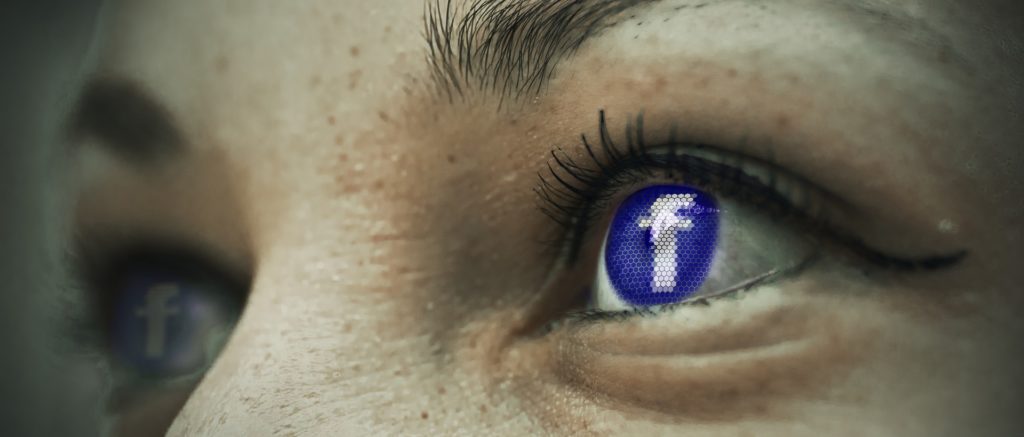
I read Lori’s most recent “Merge” column in All Access with much interest. “Why TikTok’s Billion Users Matters and the Caution to Consider” provides perspective on where this critical space is headed. She used an insightful graphic and a story from Contently as inspiration for her column.
“The Three Eras of Social Media” by Joe Lazauskas is a sharp piece that puts the last 15 or so years into some focus. It’s listed as a 5-minute read, but that’s deceiving. Set aside more time to think it through. Better yet, make it the center point of a meeting with your team.
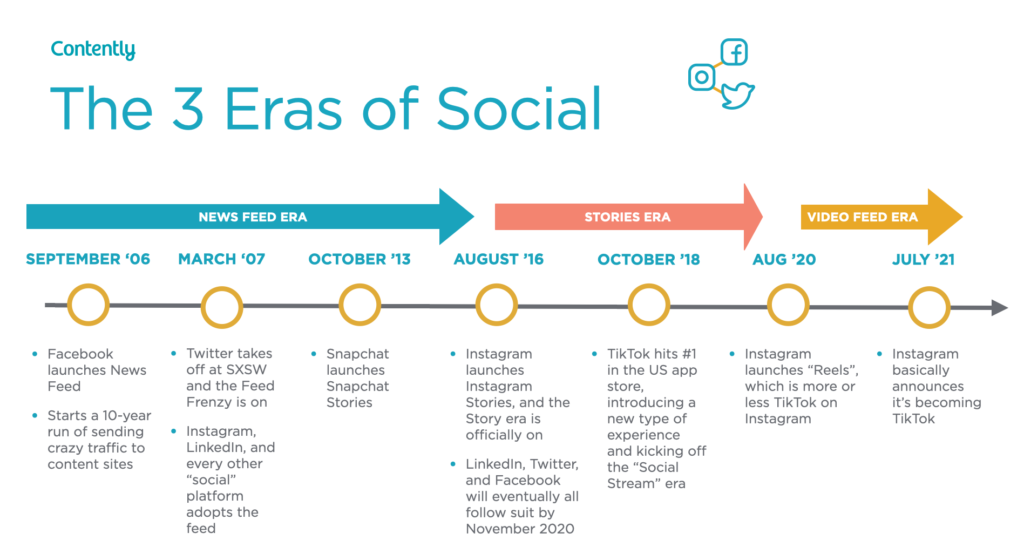
The First Era of Social is the development of Facebook’s News Feed back in 2006. Prior to that, you had to go to a friend’s page to see what, if anything, she was posting. The advent of the News Feed changed all that. And the feature began to show up on other social sites, becoming the main way users navigated them.
According to Lazauskas, that era lasted a decade, and was followed in 2013 by a second era: Stories. That’s the engine that powered Snapchat’s meteoric rise. And other social media platforms – Facebook, Twitter, and even LinkedIn – “covered” the technology with copies of their own.
And now, it’s the third era – the Video Feed – the characteristic that explains (part of) TikTok’s success. As Lazauskas explains it, TikTok has pulled off two big feats:
- Developing a tool to produce short-term videos on a smartphone
- Creating a highly addictive way to consume these videos on your phone
And that same copycat phenomenon is well underway, notably Instagram’s Reels, YouTube Shorts, and later this year, Facebook’s version of the feature.
Lasauskas urges brands to experiment on TikTok, rather than avoiding it. One billion users worldwide (and that was in early 2019 – pre-COVID) is “a thing.”
I’m a TikTok regular (no, I don’t create videos – I just scroll through them). Its clever algorithm and reliance on (mostly) real people cranking out entertaining bite-sized videos. Brands and celebrities show up in your feed now and again, but you can watch a lot of typical TikTok humor (including Dad jokes) without bumping into Henry Winkler or Ocean Spray Cranberry Juice.
Joe Lazauskas stops short of predicting the next era of social. So, I’ll jump into the fray. You’ll notice looking at his chart that like Moore’s Law, the eras of social are accelerating. That first phase – the News Feed – lasted a decade. Stories ran just four years before TikTok’s Video Feed arrived.
And that’s why a Fourth Era – propelled by the cataclysmic change that’s all around us – may be looming. It could be simply called Regulation. Or Retribution. Or both.
We saw this in Techsurvey 2021. Look at the difference in mindset in just one year. Now, a majority of respondents have warmed up to the idea of governmental intervention of mega technology companies:
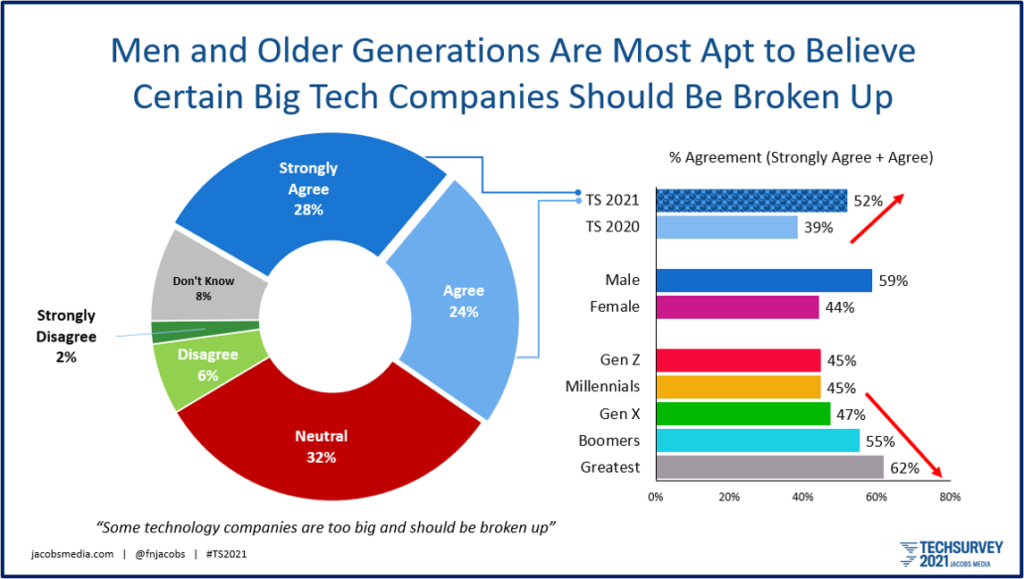
While so many aspects of our lives have guard rails – air travel, financial markets, the workplace, the environment, and yes, broadcasting – technology companies have been immune to virtually any type of oversight or control.
Much of this was brought to light by the chilling documentary, The Social Dilemma shown extensively on Netflix last year. I blogged about it exactly one year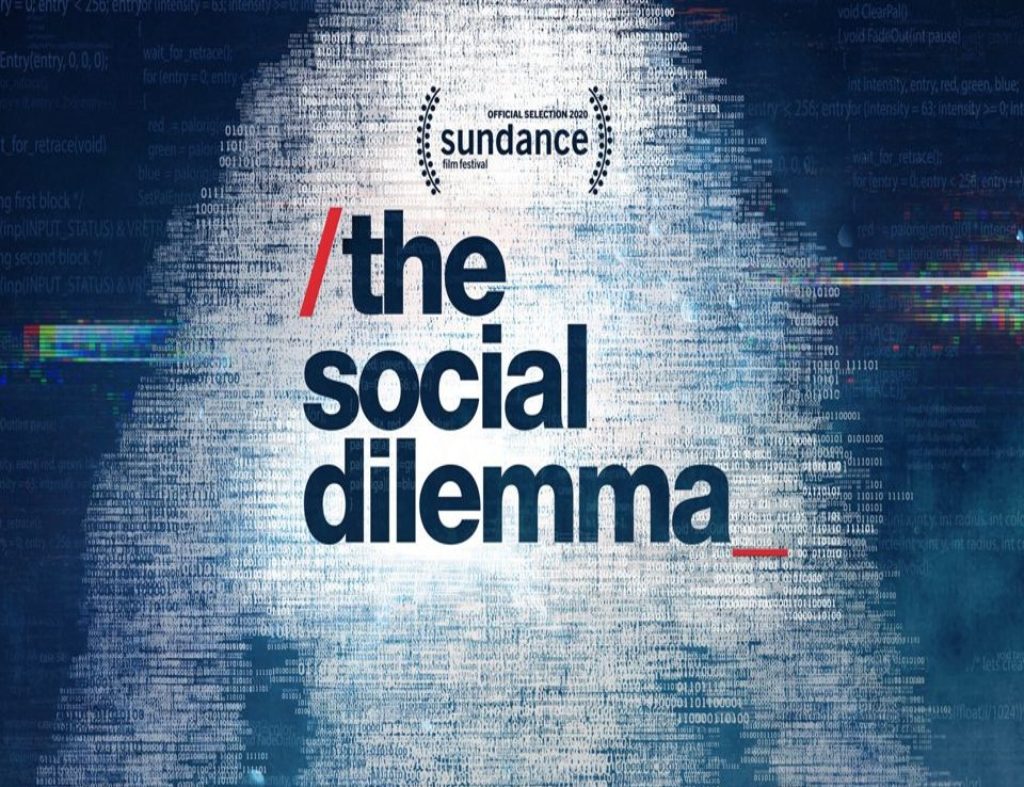 ago. The documentary was a sign that public awareness about the impact of social media in our lives was changing.
ago. The documentary was a sign that public awareness about the impact of social media in our lives was changing.
Here we are, twelve months later – with more political unrest and division in our country – and social media continues on its merry – and profitable way.
Perhaps that’s because our government is behind the curve, woefully unable to ascertain what is needed, and so polarized that very little is getting done on any front.
Yet, social media and big tech are pretty much left to their own devices. Consider: When an airplane crashes, the FAA and the NTSB are all over it, trying to figure out what went wrong. When Facebook, Instagram, and WhatsApp crash, you can hear the roaring silence.
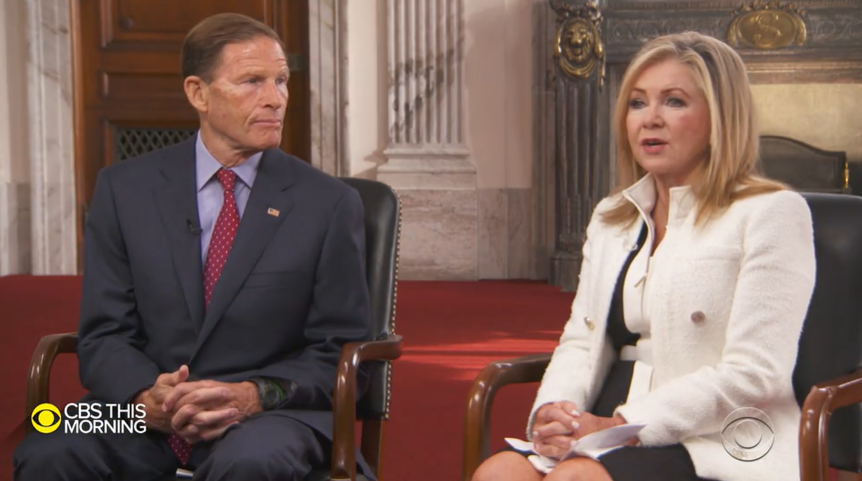
Senators Marsha Blackburn (R-TN) and Richard Blumenthal (D-CT) are as ideologically apart on the political spectrum as possible. And yet the two are working hand in glove on social media hearings that could lead to some form of reform.
Whether it ushers in the next era of social media remains to be seen. But when a core issue surrounding elections and insurrection hinges on social media, and who and what are banned on Twitter and Facebook, there’s change in the air.
Of course for radio broadcasters, many of the same decisions that have swirled through the space historically should be rethought. That is, Facebook, Twitter, Instagram, and now TikTok are platforms we rent. We don’t own them.
own them.
And therefore, we cannot control what happens to them, as we experienced again with yesterday’s outage, and perhaps we will learn tomorrow when those hearings get underway.
Of course, radio owns its proprietary assets: its tower, transmitter, and license, its websites, email databases, videos, streams, and mobile apps. That’s not to say radio brands shouldn’t continue their activities on social – that’s now mandatory.
Joe Lazauskas suggests we stop ignoring TikTok and take it seriously. His counsel is smart:
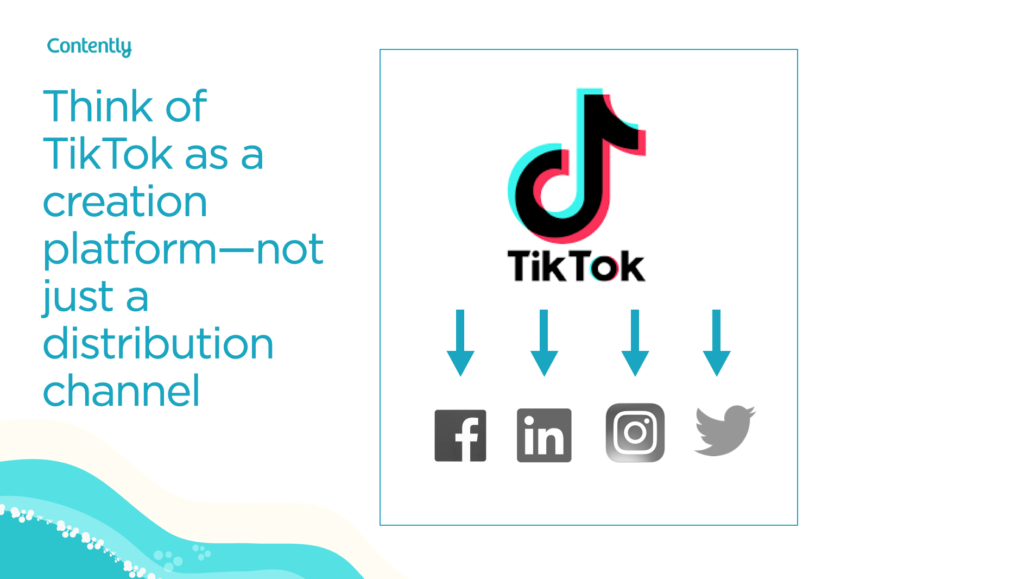
Those mini-movies you produce on TikTok can end up in a lot of places.
Lori Lewis offers a slightly different piece of advice:
“Focus more on the art of creating short-form video that’s entertaining, inspiring, or helping us discover something new.”
And she’s spot-on.
If the hammer comes down on social media in some form or fashion, a radio’s station’s (or company’s) proprietary assets will no doubt be impacted.
Watch the social space carefully.
TY to Jim O’Brien, Paul Jarvis, and Big Rick Daniels.
- Media And Technology In 2025: Believe It Or Not! - April 18, 2025
- In Radio, You Just Never Know - April 17, 2025
- The Secret To Making A Great Podcast (And Great Radio) - April 16, 2025




Nice in-the-moment blog, Fred. Very “radio” of you. 🙂
Ron, I have to at least occasionally not write about rock radio in Detroit in the 80’s. 🙂 Thanks for the kind note.
I wonder if social media will ever yield what it could contribute to our society. Talking about the various platforms and the need for some sort of regulation is important but there is one over riding issue that needs to be recognized and addressed. Humans are motivated by several things but “fear” is number one, IMHO. Think about the problems created by social media and ask yourself how this could happen. Simple: People playing on other people’s fears to help them feel more important, and less fearful. Someone smarter than me will, hopefully figure this out one day. In the meantime we will continue to be at the mercy of those small fragments of society who can only build up their own self worth by tearing down that of others.
Bob, I agree that fear is but one of the emotions that social media (and politics) prey on – FOMO is part of that, but there’s also fear that “the others” will take my jobs, and all the other propaganda that’s present on many media outlets. Sadly, social media just makes it easier and more efficient to spread it around. Thanks for commenting.
Wow – another wonderful column Fred. Some thoughts – I can’t help but notice that the age bias in those that support social media regulation seems very much in line with the age bias for Trump. I wonder how much of this year’s shift in support for that social media regulation is based more on concern anger that Donald Trump has been removed from it than about the self image of teenage girls and the collection/algorithmic manipulation of personal data.
As for regulating it, I’m afraid that ship may have sailed. Did you see Senator Blumenthal’s, (apologies to David Steinberg) “explaining alternate side of the street parking to the average cranberry” moment regarding FINSTA accounts? Talk about bringing a knife to a gun fight.
https://www.nbcnews.com/video/blumenthal-asks-facebook-exec-to-commit-to-ending-finsta-122415685773
When these are the people doing the regulating, we’re (apologies to Rosanne Cash – I guess its metaphor day) reaching for stars while we’re standing on stools. You can’t really expect people who make less (inflation adjusted) than I made in my second year as a national rep to even understand, much less take on and regulate the 9 figure techs that manage Facebook, Twitter and TikTok.
Significant progress almost always brings convenience and danger – fossil fuels are a great example. They fueled (pun intended) so much of the prosperity, quality of life and even life expectancy enhancements we’ve enjoyed over the past century or so – and unchecked, that same product will likely become a threat to many of the things it enabled.
The lesson is, when you ignore the warning signs for too long and allow the threats that accompany progress to grow unchecked, they become almost impossible to reverse, which IMO is where we are now with social media.
Bob, thanks for the kind words. Funny – I interpreted that chart about tech regulation differently. When I saw increasingly older respondent more desirous of controls on these companies or breaking them up altogether as a sign they simply don’t understand how the tech model works. On the other hand, young people tend to be more knowledgeable about how we give up privacy to get usage of apps, sites, and web tools. Now, I’m thinking about your POV.
Regarding the inability of Congress (regulators?) to hold their own against tech execs, I think two of the best on the Hill are Amy Klobuchar and AOC, both of whom get it, ask good questions, and hold Zuckerberg-like feet to the fire. But there are too few of them.
Appreciate the comment.
Thanks for your reply Fred. I retired last year and moved to Sun City, a retirement community on the west side of my hometown, Phoenix. “Fear” is on open display among the population here everyday. You can read it in their posts on Nextdoor, overhear it in restaurants and be a part of the conversation on the golf course or other recreational facilities if you choose. You may have to read between the lines, but it’s there. Perhaps that’s why I reacted the way I did. I agree the older generation tends to want to control anything they don’t understand. I don’t think they have a corner on that market, though. However, my comments were focused on what drives the problems we’re trying to deal with re social media. The driving force of the negativity that is turning us against each other. Fear. My response was probably out of place, but maybe not. We can treat symptoms but until we cure the cause we will forever be searching for bandaids. Thanks.
Enjoying the exchange between you and Bob, Fred, but my thoughts went a different direction completely. Where you both had initially different responses to why the older generations were in favor of more government oversight, I simply was surprised by the finding itself. I would think those who tend to be older and more conservative would have more of a “hands off” attitude toward government involvement and intervention, while younger people would tend to prefer to see the government step in and break up “the big guys” and make a more open field. But, even as I type, I guess everything from Starbucks to Uber to Google–and countless other examples–prove younger people are more than comfortable with huge, monolithic companies. Maybe there’s even a camaraderie there, with the sense that these are “shared experiences” with their entire generation. That’s very powerful stuff. Either way, I really missed the boat on that survey finding completely.
Thanks for this, Dave. I love when commenters come up with interesting interpretations of our research. Appreciate your “take,” as always.